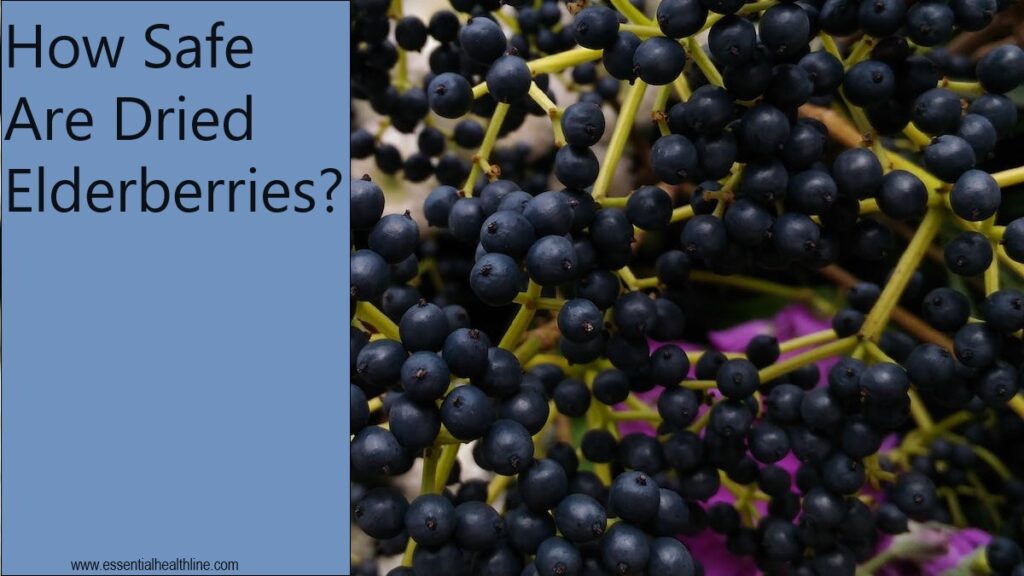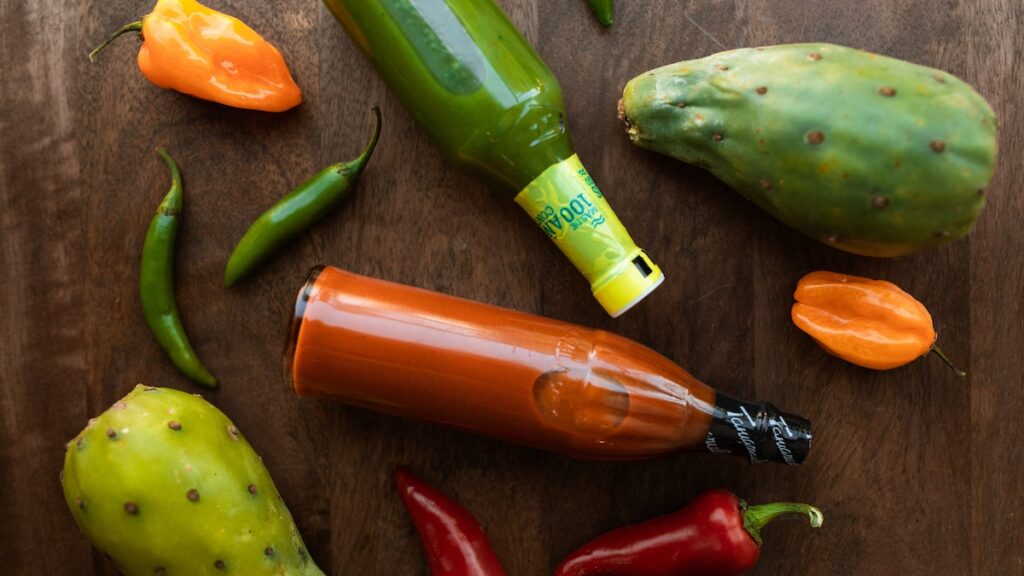Berries are a ‘one-stop-shop’ fruit for antioxidants, minerals, and vitamins. They can help you reduce your overall sugar consumption if you add them to your diet as naturally sweet.
Elderberries are one of the various varieties of the berry family and are equally loaded with health benefits. One of the common questions for many potential consumers is this: Are dried elderberries safe to eat?
Yes, dry elderberries are safe to eat when cooked. They contain an essential nutritional package, providing many potential health benefits. Also, the berry type is rich in antioxidants, offering medicinal solutions for centuries. Raw elderberries contain toxins and are, therefore, harmful.
This article profoundly explores elderberries, how to consume them safely, their benefits, and more. Let’s dive in.
What Are Elderberries?
Elderberries are one type of berries, fruits of the Sambucus tree (Sambucus nigra). The elderberry plant produces fruits in small blue elderberry or black elderberry clusters. Elderberries are native to Asia, Europe, and North America.
They have a long history of use by Native Americans and traditional European folks for their medicinal properties.
Elderberries (fresh and dried) have anti-inflammatory and antioxidant properties, giving your body various health benefits. Also, the fruits contain various essential nutrients that ensure the proper health of your body.
However, the dry elderberries have a lower nutritional value than the fresh elderberries, which is lost in the drying process.
Additionally, you can use the fruits in diverse ways, such as making elderberry tea or syrup and adding to sauce, jam, or pies.
What Is the Nutritional Value of Elderberries?
Below is the nutritional value of elderberries.
A cup serving of berries.
- Carbohydrate: 26.68 g
- Calories: 106
- Fiber: 10.2 g
- Protein: 1 g
- Fat: 0.7 g
- Vitamin A: 870 mg
- Potassium: 406 mg
- Vitamin C: 52.2 mg
- Calcium: 55 mg
- Iron: 2:32 mg
- Folate: 9 mg
Are Dried Elderberries Safe to Eat?
Yes, dried elderberries are safe to eat. However, never consume uncooked berries. Raw ones contain cyanide-inducing glycosides, a toxic substance that can lead to health issues. The symptoms of cyanide poisoning include dizziness, vomiting, nausea, diarrhea, or death in extreme cases. Also, elderberry syrup has heightened sugar levels.
Dried elderberries are an excellent addition to your diet. You can easily incorporate them into your recipes. Rehydrate the fruits and use them to prepare elderberry syrup, pies, jams, and tea. The highly nutritious fruits keep your health in check by reducing the duration and intensity of flu and cold symptoms and preventing other severe diseases.
Although dried elderberries lose some nutritional value during the drying process, they have a higher edge of a longer shelf life than in the raw form.
How to Safely Consume Dried Elderberries
Below are some safety tips to help you enjoy your elderberries without suffering from any potential risks:
- In case of any adverse symptoms, seek medical attention immediately.
- Consume elderberries moderately.
- Cook them properly before eating.
- Don’t eat the raw berries.
How Do You Prepare Dried Elderberries for Safe Eating?
The best way to prepare dried elderberries for safe eating is by cooking them correctly. Heat destroys glycosides, which induces cyanide. Consume the freshly cooked berries or freeze them for later use.
Below are ways to consume dried elderberries:
- Elderberry syrup: For about 45 minutes, simmer the dried elderberries and squeeze the juice. Mix the elderberry juice with spices and sugar to form elderberry syrup. One tablespoon daily is enough to boost your immunity. For children over one, one teaspoon daily is sufficient. Also, you can increase the intake to 3-4 hours up to 6 times a day.
- Elderberry tea: Steep dried elderberries in water (hot), and add lemon juice or honey for taste to make the herbal tea.
- Elderberries in recipes: Include the berries in your sauces, jams, jellies, and pies.
- Freezing the fruits: Free the elderberries and then thaw them to include them in your recipes. Note that freezing doesn’t destroy the harmful substance; cook the thawed berries properly.
Does Cooking Elderberries Kill Nutrients?
Yes, cooking elderberries kills some nutrients. Since elderberries contain antioxidants and minerals, the former are more susceptible to heat destruction. Therefore, nutrients like potassium, magnesium, viburnic, niacin, and shikimic acids withstand drying and heating. Antioxidants like vitamin C and anthocyanins may not survive.
However, you can recover 70% of the anthocyanins from the fruits and the water you use to cook. The content lowers most in baking soda-containing recipes and jam.
How Long Should You Cook Dried Elderberries?
Cook dried berries for at least 30 minutes for safe consumption. However, it’s recommended not to exceed 45 minutes to preserve the antioxidants. The cooking duration destroys the cyanogenic glycosides and retains about 50% of the antioxidants.
Cooked elderberries are safe to eat. They have immunity-boosting benefits.
Below are specific dried elderberry cooking durations:
Pies and jam: At least 30 minutes of cooking with other ingredients.
Tea: 5-10 minutes steeping in hot water.
Syrup: At least 30 minutes simmering.
What Are the Health Benefits of Dried Elderberries?
Dried elderberries have various potential health benefits, including the following:
- Relieving flu and cold symptoms
- Boosting immunity
- Reducing inflammation
- Protecting heart health
- Reducing wrinkles
- Relieving pain
- Preventing water retention
- Supporting gut health
- Reducing fever
- Supporting detoxification
Keep reading as we look at each benefit hereunder.
Relieving Flu and Cold Symptoms
Dry elderberry extract can relieve cold and flu symptoms. It prevents flu and shortens the severity and duration of the common cold.
The syrup does so by deterring viruses from entering your body during the flu season.
Its ability to fight these health conditions makes the fruit a strong weapon against seasonal allergies like nasal and sinus congestion.
Boosting Immunity
Elderberries have antioxidant, anti-inflammatory, and antiviral properties that can enhance your immune system.
The antioxidant compounds offer immune support by protecting your cells from damage by free radicals.
On the other hand, the anti-inflammation and antivirus substances fight infections.
Reducing Inflammation
The elderberries’ anti-inflammatory compounds tame inflammations in the entire body. They contain anthocyanins — a flavonoid type with anti-inflammatory features — that relieve joint pain and sore throat-caused inflammations.
Protecting Heart Health
The ability to lower cholesterol and blood pressure levels helps elderberries to improve your heart health. Eating fruits regularly and properly keeps heart problems away.
Reducing Wrinkles
Vitamin A is one of the abundant nutrients in elderberries. The vital nutrient boosts collagen production, quickening wrinkles and aging skin treatment.
Thus, the fruits soothe your skin, give it a younger and smoother appearance, or prevent or reduce wrinkles.
Relieving Pain
The medicinal fruits have pain-relieving properties that can reduce inflammation-related-associated conditions like arthritis. Also, their consumption can relieve muscular, sinus, and nerve pains.
Preventing Water Retention
Elderberries can serve as a natural diuretic to promote urination. They’re ideal if you have a water retention problem.
Supporting Gut Health
A healthy gut is among the benefits you gain from eating dried elderberries correctly. They have a laxative effect that relieves digestive system issues such as constipation.
Reducing Fever
Consuming dried elderberry syrup can minimize fever. Elderberries have antipyretic properties that normalize high body temperatures.
Supporting Detoxification
The diaphoretic properties of elderberries promote sweating. As a result, your body gets rid of toxins and enhances weight loss.
What Are the Methods of Drying Elderberries?
Below are four methods of drying elderberries:
- Sun drying
- Oven drying
- Dehydrating
- Freeze drying
Sun Drying
The oldest and simplest method of berry drying is sun drying. Sunny and low-humidity locations are ideal for drying elderberries. The drying period depends on the sun’s availability and temperatures. You should expect the process to take 3-4 sunny consecutive days.
Here are the drying tips:
- Spread the elderberries evenly in the sun on a clean, drying screen, dry cloth, or baking sheet.
- Cover them properly with a mesh cloth to ensure efficient airflow and prevent them from bird or insect damage.
- Ensure the area is dust-free and dirt-free and has access to direct sunlight.
- Give your berries enough drying time until they become firm and raisin-like.
Oven Drying
You can allow the berries to stay in the oven under low temperatures or use the leftover heat after using the oven.
Here are the drying tips:
- Preheat your oven for about 3 minutes at 50°C (120°F) or lower.
- Spread your washed elderberries on a baking tray lined with a cookie sheet and place them in the oven.
- Leave the oven door slightly ajar to allow moisture to escape.
- Check your fruits regularly to prevent overcooking until they have a firm feel.
- Allow your berries to cool after drying. The process may take 10-12 hours.
Dehydrating
Electric dehydrators are more precise than sun drying and more and more energy-efficient than oven drying.
- Spread the berries on a dehydrating tray or clean container.
- Set the dehydrator’s temperature to about 135 degrees Fahrenheit (57 degrees Celsius) or according to your dehydrator’s instructions.
- Set the time to about 8-10 hours and increase the time if they aren’t completely dry.
Freeze Drying
A freeze dryer maintains up to 97% of the elderberries’ nutrients. Hence, the fruits retain their true medicinal capability and health benefits.
- Place your clean elderberries onto the freezer’s drying trays.
- Start the freezing and drying process.
- Ensure the berries are thoroughly dry and store them appropriately.
Conclusion
What’s the verdict? Are dried elderberries safe to eat? Yes, when appropriately cooked. Although the dried version loses some nutrients during drying, it still offers countless potential health benefits.
Hence, adding the berries to your diet can significantly boost your health.
The potential health benefits of dried elderberries include boosting immunity, gut health, and heart wellness. Also, they relieve flu and colds, pain, and fever. Additionally, these fruits prevent water retention, wrinkles, and inflammation.
Avoid consuming raw elderberries as they contain a harmful, hazardous compound known as cyanogenic glycosides.



